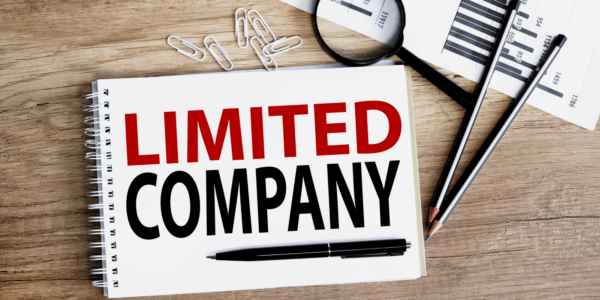Every business needs to operate within a defined legal structure. If you’re considering setting up a business, one of the questions you need to ask yourself is whether to be a sole trader or limited company. We will discuss both structures below to help you to make an informed decision that is best for you and your business.
Key takeaways
- Choose a sole trader structure for simplicity and minimal paperwork if your business poses low financial risk.
- Transitioning to a limited company can enhance credibility and access to financing as your business grows.
- Limited companies generally provide better tax planning opportunities compared to sole traders, optimising overall tax efficiency.
What is a sole trader?
Being a sole trader means you’re self-employed and can keep any profits you earn after tax. It is important to be aware that, as a sole trader, you will be personally responsible for any losses your business makes.
Setting up as a sole trader is simple and you can start trading immediately.
Once you earn more than £1,000 in a tax year (which starts on 6 April and ends on 5 April the following year) you’ll need to register for Self-Assessment. If turnover exceeds £90,000 in any 12-month period, you’ll need to register for VAT.
As the most popular business structure in the UK, around 60% of businesses fall into the sole trader category.
What is a private limited company?
This business structure has its own legal identity, separate from that of its owners (aka ‘shareholders’ or ‘members’) and directors (who may also be shareholders). Members of a limited by shares company receive dividends from post-tax profits. Directors are usually paid a salary. If they are also shareholders, directors can receive all or some of their income in the form of dividends.
The limited liability nature of this type of business structure means that the personal assets of members are not at risk if the business runs into financial difficulty. Rather, shareholders only risk losing what they have already invested in the company and/or agreed to pay for their shares.
There are more legalities involved with running a limited company. The directors, who are legally responsible for all day-to-day management and corporate compliance, must ensure that the company meets its statutory obligations.
This includes preparing annual accounts and confirmation statements (previously the ‘annual return’) with Companies House, submitting tax returns and statutory accounts to HMRC, and adhering to all record-keeping and disclosure requirements prescribed by the Companies Act 2006.
What are the advantages of being a sole trader?
- Simple to establish: It is easy to register as a sole trader and sign up for Self Assessment. You must do this by 5 October after the end of the tax year in which you start trading. You’ll receive a 10-digit Unique Taxpayer Reference (UTR) when you register for Self Assessment, which will enable you to report your earnings and pay Income Tax and National Insurance to HMRC.
- Free to set up: Unlike a limited company, you don’t need to pay to register as a sole trader. However, company formation packages generally start at only £51.99 +VAT, so setting up a limited company is not at all expensive.
- Less red tape: Sole traders generally have fewer government departments and administrative obligations to deal with. Just submit a tax return once a year, be sure to pay your tax and National Insurance on time, and keep a record and evidence of all business income and expenditure.
- Less paperwork: Aside from completing your annual online Self-Assessment tax return, reporting and record-keeping requirements are comparatively minimal.
- Privacy: Being a sole trader allows for more privacy, unlike a limited company where accounts and registered office details are in the public domain. Details of other directors, company owners, and people with significant control (PSCs) will also be on the public record at Companies House.
What are the disadvantages of being a sole trader?
Despite this being the most popular business model, there are disadvantages of being a sole trader:
- Personal liability: Because sole traders are not classed as separate legal entities to their businesses, the liabilities or debts of the business are, in fact, the liabilities and debts of the individual sole trader. Anything that your business owes to creditors will have to be paid from your own personal finances and assets. As a result of this unlimited liability, you risk losing your home. You could also face potential bankruptcy.
- Perceived lack of prestige: Although not necessarily true, potential clients may view a sole trader business as having less credibility and prestige than a limited company.
- Reduced access to finance: Sole traders often find it difficult to raise capital. Banks prefer the accounting transparency provided by limited companies, so loans may be smaller than those offered to limited companies. In addition, sole traders are unable to offer shares or other securities in exchange for investment.
- Some customers avoid sole traders: You may find that certain potential clients prefer to deal with limited companies because they view sole traders as presenting a higher risk. Indeed, some sectors will only deal with limited companies.
- Tax-planning limitations: Sole traders’ profits are subject to Income Tax in the financial year they are earned. This can lead to certain restrictions when compared to the options available to limited companies.
What are the advantages of being a limited company?
- Your financial liability is limited: limited financial liability (of shareholders) is one of the main advantages of being a limited company. Should the company cease operation, you generally only lose the sum you invested.
- Limited companies can be easier to finance: securing finance can be easier because limited companies are separate legal entities. It is possible to raise capital by issuing new shares to shareholders and investors. This doesn’t include members of the public.
- A limited company is a separate legal entity: the advantage of being a separate entity from its owner(s) is that the company will continue to exist and operate if members die or retire – thereby making employees’ futures more secure.
- More tax-efficient: limited companies pay Corporation Tax rates, which are lower than the Income Tax rates payable by sole traders. Profits can be ploughed back into the business to invest in new equipment or staff, rather than taking it out as taxable payments. Any withdrawal of personal profits (i.e. as dividends) can be deferred.
- Increased trust and credibility: because limited companies have to comply with more statutory rules, accounts are public which can instil trust – especially useful if you’re looking for new investors. If your competitors are mainly limited companies, this helps you compete with them on a level playing field.
What are the disadvantages of being a limited company?
- More paperwork: ongoing requirements to comply with include filing annual accounts and a confirmation statement. Quality Company Formations can provide a Confirmation Statement Service for only £59.99 plus VAT.
- Added expense: unless you have the time and skills to dedicate to accounting responsibilities, you may decide to enlist the services of an accountant, which is an added expense to factor in. The cost of an accountant preparing annual accounts for a small business is generally between £800 and £1,500 per year, depending on their complexity.
- Company records are made public: certain information is available to the general public, including company accounts, names of directors, owners/individuals with significant control, and the company’s registered office address. Information is held on the Companies House register.
Can I switch from being a sole trader to a limited company?
Absolutely. You may decide that you want the security of limited liability or, if profits are flowing in, you may want to benefit from the greater tax efficiencies.
Here are a few things that you’ll have to do if you decide to change the legal structure of your small business:
- Inform HMRC – changing the legal structure will have a bearing on the tax you have to pay.
- Register your business with Companies House by incorporating a private company limited by shares.
- Set up a dedicated business bank account for your new limited company.
- Tell everyone and anyone who needs to know – e.g. customers, suppliers and service providers, banks, lenders, landlords, and insurers.
Whatever your reasons for wanting to make the switch from sole trader to limited company, it’s not difficult to do. You can do it yourself or enlist the help of a company formation agent like Quality Company Formations.
Can I change from being a limited company to a sole trader?
Although more unusual, it is possible. There is a formal winding-up procedure to follow:
- Prepare the final set of company accounts and file with HMRC and Companies House
- Settle any outstanding tax payments with HMRC
- Ensure that any money in the company’s bank account is transferred out
- Transfer out any assets held in the company’s name (for example domain names)
- If the company is party to any outstanding contracts, arrange for these to be novated or have new contracts drawn up in the name of the new limited company
- Once completed, the company should formally request to be dissolved. This is done on the authority of the directors agreeing to close the company, after which an application is submitted to Companies House.
- Creditors, suppliers, employees, directors, or members of the company should be informed of the application to dissolve the company.
- Once the application to dissolve the company has been received and accepted by Companies House, the company will be dissolved and struck off the company register within 2-3 months.
Note: As an alternative to company dissolution, you may want to make the company dormant, in case you ever need it again in the future.
What’s better for tax – being a sole trader or limited company?
There is no hard and fast rule. In general, however, operating as a limited company offers more opportunities for tax planning and optimising efficiency. Limited companies currently pay 19%-25% Corporation Tax on profits, compared to 20-45% Income Tax paid on sole trader profits (or 19-48% if you pay Scottish Income Tax).
While directors and shareholders are liable to personal tax on any money they receive from their companies, the overall tax liability will generally be lower than if they were to receive the same amount of income as a sole trader.
- How to form a limited company: 5 requirements
- How to pay yourself through a limited company
- When should I register for VAT?
Reinvesting profits – instead of withdrawing the full extent of profits each year, as is the case with sole traders, it is possible to divert surplus income to pay for equipment, operational costs, taking on new staff, and growing the business. There is more flexibility in terms of timings, as sole traders generally need to utilise any surplus profits in the same financial year in order to avoid paying tax on that income.
Deferring dividends – the withdrawal of any profits as dividends can be deferred to a later tax year (e.g. to avoid a higher Income Tax or dividend tax bracket).
Are some businesses better suited to being a sole trader or limited company?
The legal structure you choose for your business depends on personal preference and the stage you’re at in your business journey.
If you’re a small business with few or no overheads, like a dog walker or content writer, for example, there might be little advantage to setting up a limited company.
However, if your particular business model means that you have a number of suppliers to pay on a regular basis, or your sole trader business starts developing in this way, then you may decide that you’d like the protection that comes from operating as a limited company.
The bottom line – sole trader or limited company?
We know this is a difficult decision to choose between sole trader or limited company, so we have created some simple scenarios and made our recommendations for each.
1. My business will not expose me to financial risk should it fail, my turnover will be small and there will be no reputational benefit from limited company status. We recommend: Sole trader.
2. I will require paying a lot of suppliers for stock and I will need a bank overdraft facility and possibly a business loan in the first 24 months. We recommend: Limited company.
3. My competitors are in general terms quite large businesses who are all limited companies or PLCs. I will require taking a brick and mortar lease for business premises, and other leases for equipment and delivery transport. We recommend: Limited company.
4. My 5-year business plan incorporates a steep growth curve where I will be aggressively expanding the business and employing staff. I will have a substantial turnover, with considerable business expenses; therefore, flexibility with regards to tax matters is of interest to me. I may also wish to take on new investors during this period. We recommend: Limited company.
Please note that the above examples are simply for illustrative purposes, with each recommendation based only on our general opinion. If you are in any doubt about whether to run your small business as a sole trader or limited company, we strongly advise that you obtain professional advice, particularly on any tax-related matters.














Join The Discussion